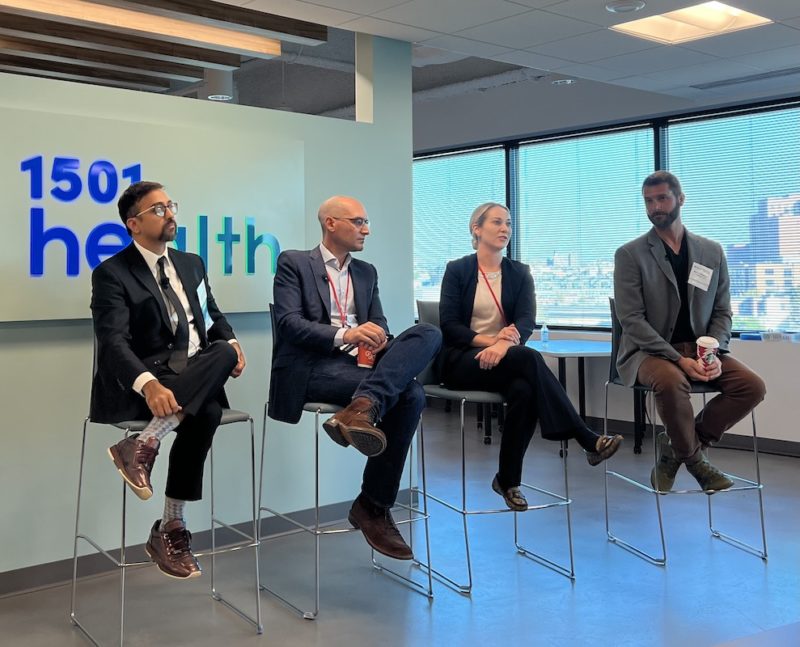With world-class hospital systems and healthcare networks proliferating in the region, Baltimore has become an increasingly important hub for healthcare innovation.
And with so much money to be made in the life sciences sector, the Baltimore Regional Tech Council (BRTC) made things a little easier by gathering founders and corporate innovation leaders for an insightful discussion on how to achieve win-win partnerships.
Here are some key takeaways from the BRTC’s panel at CareFirst’s tower in Canton last week.
Advice for founders
Nick Culbertson, CEO of healthcare compliance tech company Protenus, cautioned founders to ensure ideas are aligned with business outcomes and advised them to be fluent in profit and loss.
“You need to show a clear value proposition on how you will help healthcare companies make money or save money, as hospitals need money to fulfill their mission of improving health outcomes,” Culbertson said.
Healthcare systems are not incentivized to take risks and work with startups on pilots, and there is growing pressure to show a return on investment almost immediately. Protenus initially offered a no-risk contract where the hospital only pays if the pilot was successful. This approach helped Protenus raise initial funding at its pre-revenue stage. The company was thus able to show proof of concept and that it was solving a problem that healthcare systems will pay to fix.
Alex Cameron, a senior director at BD, advised founders to build processes and systems so that prospective partners don’t encounter red flags.
“Founders should also be pounding the pavement,” Cameron told Technical.ly. “In-person events are more valuable because it is easier to communicate value proposition in-person in two minutes, as opposed to via email.”
Cameron serves on the board of the Maryland Tech Council, the BRTC’s parent organization, and is excited about the recently created sub-council’s role in strengthening the life sciences ecosystem through organic meetings and events.
What corporate leaders seek
Pothik Chatterjee, LifeBridge Health’s assistant vice president of innovation, said that the provider network is eager to connect with disrupters early on instead of facing potential disruption later.
“We are especially interested in hybrid care for low acuity conditions where patients don’t need to go to the hospital,” Chaterjee said.
He cited BabyLiveAdvice, a maternal health company that provides new and expecting parents with virtual on-demand support such as lactation coaching, as a prime example.
Chatterjee and Cameron also see tremendous opportunities in continuous monitoring and testing. The current healthcare system relies on annual checkups, in which the tests may or may not catch an illness or disease.
Win-win partnerships
Heather Townsend, COO of Annapolis-based Even Health, credits the 1501 Health incubator — formed of a partnership between CareFirst and LifeBridge Health, and including Even Health and BabyLiveAdvice among its first cohort — with connecting the company with LifeBridge Health for a pilot. 1501 Health was instrumental to the company’s growth as it navigated the healthcare ecosystem. Even Health is now one of 30 finalists for Mission Daybreak, the U.S. Department of Veterans Affairs’ $20 million challenge to reduce veteran suicides.
These and other opportunities could be available to those who apply to 1501 Health, which will be exhibiting during the HLTH 2022 conference in Las Vegas next week.
Before you go...
Please consider supporting Technical.ly to keep our independent journalism strong. Unlike most business-focused media outlets, we don’t have a paywall. Instead, we count on your personal and organizational support.
3 ways to support our work:- Contribute to the Journalism Fund. Charitable giving ensures our information remains free and accessible for residents to discover workforce programs and entrepreneurship pathways. This includes philanthropic grants and individual tax-deductible donations from readers like you.
- Use our Preferred Partners. Our directory of vetted providers offers high-quality recommendations for services our readers need, and each referral supports our journalism.
- Use our services. If you need entrepreneurs and tech leaders to buy your services, are seeking technologists to hire or want more professionals to know about your ecosystem, Technical.ly has the biggest and most engaged audience in the mid-Atlantic. We help companies tell their stories and answer big questions to meet and serve our community.
Join our growing Slack community
Join 5,000 tech professionals and entrepreneurs in our community Slack today!

The person charged in the UnitedHealthcare CEO shooting had a ton of tech connections

From rejection to innovation: How I built a tool to beat AI hiring algorithms at their own game

Where are the country’s most vibrant tech and startup communities?



